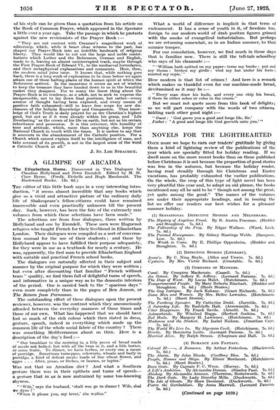A GLIMPSE OF ARCADIA
the Elizabethan Home. Discovered in Two Dialogues by Claudius Hollyband and Peter Erondell. Edited by M. St. . Clare Byrne. (Fredk. Etchells and Hugh Macdonald. The Haslewood Books. 12s. 6d.)
THE editor of this little book says in a very interesting intro- duction, " it seems almost incredible that any books which give us a vivid and attractive picture of the ordinary daily life of Shakespeare's fellow-citizens could have remained inaccessible and even practically unknown till the present .day. Such, however, has been the fate of the extremely rare volumes from which these selections have been made."
The selections are from four dialogues, three written by Hollyband and one by Erondell. These men were Huguenot refugees who taught French for their livelihood in Elizabethan I,ondon. Their dialogues were compiled as a sort of conversa- tion manual for the use of their students ; and those by Ilollyband appear to have fulfilled their purpose adequately, for they were in use as a textbook for nearly a century. He was, apparently, the first man to provide Elizabethan England with suitable and practical French school books.
The dialogues are naturally affected in their subject and manner by the original purpose for which they were written ; but even after discounting that familiar " French -without tears " quality, we find them full of delightful turns of speech, and informative in a unique way as to the domestic interiors of the period. One is carried back to the " spacious days " even more completely than in the pages of Ben Jonson, or The Return from Parnassus.
The outstanding effect of these dialogues upon the present reviewer, however, was the contrast which they unconsciously afforded between the everyday manners of those times and those of our own. What has happened that we should have lost so much of the rich colour which then rioted in dress, gesture, speech, indeed in everything which made up the common life of the whole social fabric of the country ? There was something Mediterranean about us. then. Here is a description of the day's food :- " Our breakfast in the mornina° is, a litle peeve of bread made of meale not hilted, but with all the bran in it, and a litle butter, Or some fruits. To dinner, we have horbes, or every one a messe of porridge. Sometimes-turneppes, coleworts, wheate and barly in porridge, a kind of delicat meat.) made of fine wheat flower, and cgges . . . After, pease, or fitches, or beanos, or lupins."
Was not that an Arcadian diet ? And what a Southern gesture there was in their epithets and turns of speech- a gesture that in us is now restrained by some too-knowing
shyness. - " 'Wife,' says the husband, 'shall wee go to dinner ? Wife, shat we dyne ' When it please you, my lover,' she replies." What a world of difference is implicit in that term of endearment. It has a sense of youth in it, of freedom too, foreign to our modern world of drab puritan figures grimed with the smoke of evangelical industrialism. But perhaps we are returning somewhat, as in an Indian summer, to that
sunnier- temper..
For our consolation, however, we find much in those days that is familiar now. There is still the tell-tale schoolboy who says of his classmate " William hath spitted on my paper : tome my books : put out my theme : broken my girdle : trod my hat under his feete marred my copie.' "
1-low- modern is that list of crimes ! And here is a remark which makes us thankful even for our machine-made bread, devitamined as it may be
" Every man draw his knife, and every one chip his bread, if there be either ashes or colas in the cruste."
But we must not quote more from this book of delights; so we will part company with the words of two citizens bidding each other goodnight ;
" Guest : ' God geeve you a. good and longe life, Sir.' Father : A good and lenge life God geeveth unto, you.' "










































 Previous page
Previous page